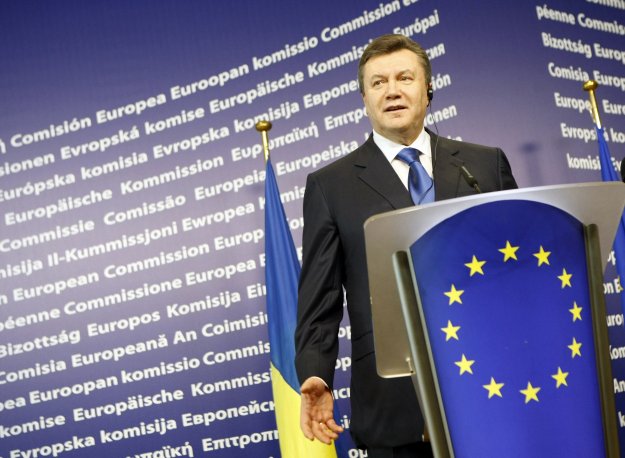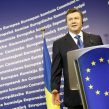
Viktor Yanukovych Two Years on: Why Many Got Him Wrong
Publication: Eurasia Daily Monitor Volume: 9 Issue: 39
By:

February 25 will mark the second anniversary of Viktor Yanukovych’s election, during which attitudes toward him and his administration have hardened. But this was not always the case, and views of Yanukovych can be divided into three groups: to order, naïve and realistic.
To Order: From 2005, Yanukovych and the Party of Regions hired US political consultant Paul Manafort who had worked on the presidential campaigns of George W. Bush, Bob Dole, George H. W. Bush, Ronald Reagan, and Gerald Ford, and is a senior partner in Davis, Manafort and Freedman consultancy company. In an evident conflict of interests, Rick Davis would have become Senator John McCain’s chief of staff, an ardent supporter of the 2004 Orange Revolution, had the latter won the 2008 US presidential elections.
Two other US supporters of Yanukovych were Bruce P. Jackson and Adrian Karatnycky. Jackson, a former military intelligence officer and Vice President of Lockheed Martin is President of the Project on Transitional Democracies (see interview at https://www.day.kiev.ua/303062). Karatnycky, the former President of Freedom House, was President of the pro-Yushchenko Orange Circle until switching sides in 2009. Mykola Knyazhytskly, the CEO of the Ukrainian independent TBi channel, told Jamestown that he believed Karatnycky’s business consultancy for Igor Gusinsky, who with another exiled Russian oligarch Konstantin Kagalovsky founded TBi, led to his cooperation with Serhiy Levochkin, the head of Yanukovych’s presidential administration. Gusinsky and Levochkin are long-term friends.
Karatnycky drew on his position at the Atlantic Council of the United States, where he is Senior Fellow, to organize Yanukovych’s first speech in the US in September 2005, at the New York office of the Atlantic Council (https://www.acus.org/event/president-yanukovych-addresses-atlantic-council/transcript). Yanukovych told the Atlantic Council, “When the Orange Revolution began, and I heard those pleas, which the leaders of the Orange Revolution addressed the people with, they were very familiar to me, and I liked them,” in what was a clearly pre-written text that had nothing to do with reality (https://en.for-ua.com/news/2010/09/24/125036.html).
Karartnycky has written fifteen op eds in defense of Yanukovych’s record (see list at https://www.acus.org/user/59/track). The majority of the predictions and claims about Yanukovych’s plans and policies never came to fruition (see “Time for a Reality Check” at https://www.kyivpost.com/news/opinion/op_ed/detail/104145/). Since 2011, Karatnycky and the Myrmidon Group are lobbyists for the Bosnian-Serbian government according to documents registered with the Foreign Agents Registration Act, US Department of Justice (https://www.fara.gov, https://myrmidongrpllc.com).
Naïve: Naivety came together with Ukraine fatigue in Yushchenko and Tymoshenko. US Embassy cables from Kyiv during the 2010 elections describe Tymoshenko and Yushchenko as “populist,” while being upbeat about Yanukovych’s economic program in cables entitled “Yanukovych Acolytes Preach Economic Orthodoxy” (https://wikileaks.org/cable/2009/12/09KYIV2124.html) and “Presidential Economic Adviser Stresses Need for Reform, Cautions Realism” (https://wikileaks.org/cable/2010/02/10KYIV301.html).
The second US cable strangely describes oligarch Rinat Akhmetov’s think tank as “widely respected.” Following Yanukovych’s election, the second US cable wrote, “Her appointment as the First Deputy Head of the Presidential Administration shows that (Iryna) Akimova has Yanukovych’s ear and bodes well for the prospect of economic reform.” Two years into Yanukovych’s presidency, Akimova (like Deputy Prime Minister Sergei Tigipko) has little influence, economic reforms are nowhere to be seen and Ukraine’s relationship with the IMF has been frozen for the past year.
The former US Ambassadors to Ukraine Steven Pifer and William Taylor argued until the summer of 2011, that the Yanukovych administration was listening to Western criticism, which it patently was not (https://www.brookings.edu/experts/pifers.aspx). In the last few months, Ambassador Pifer has taken a tougher stance and in testimony in February before the US Senate Foreign Relations Committee he said, “It may be time for US and EU officials to consult as to whether it is appropriate to consider lists of Ukrainian individuals who would be denied visas to visit the United States and EU member states” (https://www.brookings.edu/testimony/2012/0201_ukraine_pifer.aspx).
Other commentators wanted to believe that Yanukovych had “changed.” Yale University Professor Timothy Snyder believed, like many observers, that Yanukovych would continue to pursue a Kuchma-style multi-vector foreign policy, would not put Ukraine in Russia’s orbit and not abandon pro-European rhetoric (https://www.nybooks.com/articles/archives/2010/mar/25/gogol-haunts-the-new-ukraine/?pagination=false). European rhetoric is meaningless if a regime rolls back democracy at home and Ukraine’s relations with the EU are therefore frozen.
Incredibly Snyder, like the US Embassy cables and the Financial Times, believed Tymoshenko was the bigger threat to democracy in Ukraine than Yanukovych. A Financial Times editorial (January 10, 2010) wrote, “Only a stable Ukraine can achieve economic reform and recovery. Ms. Tymoshenko is the polar opposite of a stabilising force. Mr. Yanukovich [sic], for all his manifest faults, may prove the lesser evil.”
Quoting Karatnycky, Snyder sees Ukraine’s oligarchs as becoming “economically transparent,” supporting the rule of law and reducing corruption. None of these claims have materialized and the rule of law is in free fall; and corruption, according to Transparency International, is massively on the increase.
Snyder’s belief that Ukraine’s oligarchs may have learned “not to flaunt money,” did not take into account that ‘bling’ is central to nouveau riche Ukrainians. Imprisoned former Prime Minister Pavlo Lazarenko’s purchase of a Californian mansion for $6 million in cash was just under the $6.2 million spent by Ukrainian oligarch Pinchuk to entertain 300 guests at his 50th birthday party in the posh French ski resort of Courchevel on New Year’s eve in December 2011 (https://www.guardian.co.uk/world/2010/dec/17/courchevel-host-billionaire-party). Lazarenko’s home cost even less when compared with the $150 million paid by Pinchuk for the world’s most expensive home in London and $220 million paid by Donetsk oligarch Akhmetov for three penthouse apartments in London’s exclusive Knightsbridge.
Realists: the British Guardian reporter Luke Harding, expelled from Russia in 2011 and author of “The Mafia State,” about Vladimir Putin’s Russia, was told by Yanukovych’s aides in the 2010 elections that he was now a reformed democrat, was passionate about Europe and had learned English. This was reminiscent of Soviet disinformation about former KGB leader and officer, Yuri Andropov, and Putin as “modernizers” following in the footsteps of Peter the Great.
Harding recalls that such disinformation about Yanukovych “was repeated in Brussels, London and Washington” (The Guardian, October 11, 2011). Repression of Tymoshenko and others opposition leaders proves he is no different from the election fraudster in 2004, Harding believes (The Wall Street Journal, October 11, 2011).
Ukrainian academics were more doubtful that Yanukovych was a changed man. Kyiv Mohyla Academy Professor, Serhiy Kudelia, observed that Yanukovych is “a perfectly strategic politician whose power-maximizing instincts led him to the most rational choice available” of imprisoning Tymoshenko and other leaders. Kudelia was referring to the difficulty of group two commentators in understanding Yanukovych and only seeing somebody undertaking “utterly irrational and suicidal” actions (https://www.gwu.edu/~ieresgwu/assets/docs/ponars/KudeliaOct18.pdf).
Western commentators, with the exception of Jamestown Foundation analysts, fell into the trap of Kremlinology by dividing the Party of Regions into doves and hawks with the former allegedly pro-European and committed to democracy and the rule of law. In reality, Ukraine’s oligarchs have introduced censorship on their television channels, continued to indulge in non-transparent and biased privatizations, ignored abuse of the rule of law and constitution and did not protest at the loss of access to the world’s biggest market through the Deep and Comprehensive Free Trade Agreement with the EU. Western commentators on Ukraine would be wise to heed Aleksandra Kuzhel’s words that “None of them stole honestly!” (Ukrayinska Pravda, November 30, 2011).
In December 2009, Yanukovych told US Ambassador to Ukraine John F. Tefft that he had five priorities for Ukraine: 1.) economic growth and fighting corruption; 2.) resetting relations with Russia; 3.) improving relations with the EU and finalising the Association Agreement; 4.) developing a constructive relationship with NATO; and 5.) ensuring a close partnership with the US (https://wikileaks.org/cable/2009/12/09KYIV2175.html). None of these five priorities have been fulfilled.
As EU leaders have found out late in the day: do not believe everything Yanukovych (and his cheerleaders) say.




